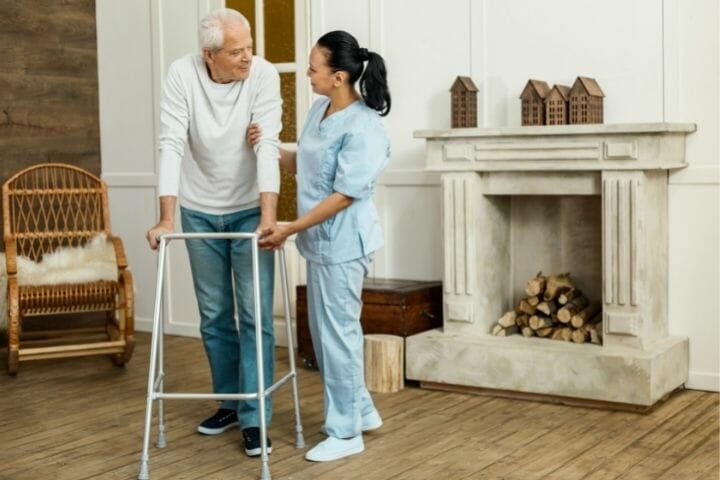The close proximity between patients and caregivers sometimes results in romance. A romantic attraction is considered unethical because it causes the caregiver to lose objectivity. Let’s see how to manage such a situation.
Contents
A caregiver and patient may find it difficult to return to a strictly professional relationship if they have developed an intense romantic connection to one another.
If you develop an intimate relationship with a patient, particularly if it seems to be reciprocated, you may run into some difficulties.

You might be accused of professional misconduct and perhaps even get fired if you had an affair with one of your patients. All of us are aware that this is unethical. We must never cross the line between a professional and a therapeutic connection when treating our patients.
You might like to read: Adverse Childhood Experiences’ Impact On Mental Health
Why Do Patients Develop Romantic Attachment To Their Caregivers?
Close relationships between caregivers and patients are not uncommon. A strong bond may develop between the elderly or disabled and the people they depend on daily. The relationship between a patient and their caregiver can quickly turn into more than just a pleasant friendship.
“Transference” is a term used by mental health practitioners to describe this phenomenon. Physicians, nurses, and home health aides may all be affected by this.
Personal attention may seem more vital than professional care for the elderly who have lost a spouse or other close family member. Those in need of help and compassion may confuse professional aid with love.
You must take a step back and examine critically if your patient is showing romantic attraction towards you. It may be helpful to jot down your thoughts or speak with a trustworthy coworker or management about your dilemma. You may use this technique to guide your next move.
How To Evaluate If I Have Gone Beyond Professional Boundaries?
To establish whether your connection with the patient has crossed into a romantic one, analyze your interactions with the patient. Ask yourself whether you’re doing things for yourself rather than the patient.
Determine whether or not the connection is no longer therapeutic. Ask yourself these questions:
- Do other patients suffer due to your excessive attention to this one sufferer?
- To spend more time with them, do you reorganize and redistribute your duties and obligations?
- Is there no doubt in your mind that you are the only one qualified to provide the level of care that the patient requires?
- When you meet with a patient, do you talk about personal matters, such as home or work troubles?
If your answer to these questions is yes, then perhaps you are providing more personal attention than is strictly required for therapeutic purposes to your patient. Some other signs of a romantic relationship developing might be:
- Your touch on the patient’s arm, for example, may become habitual.
- There are endearments exchanged as “Hello, Sweetie!”
- You go above and above what is necessary by law to protect the confidentiality of patient information (e.g., hiding some of their symptoms in case of mental problems)

You might like to read: How a Gap in Health Can Affect Relationships
What Should A Caregiver Do If The Patient Is Showing Romantic Attraction On Their Own?
Evaluate Why This is Happening
Basic abilities, including speech and memory, are often impaired in patients who have had a traumatic brain injury (TBI). People with traumatic brain injuries may be less concerned with following rules and regulations and more likely to engage in risky or even dangerous behavior.
This is because the part of the brain responsible for reacting to stimuli, taking risks, and adhering to rules is frequently affected by trauma.
Patience is the essential quality a caregiver can have in these situations. Caregivers must be aware that people who have been injured may not regulate their behavior.
Providing the wounded party with more time to cool down and form fresh opinions. A combination of rationality, optimism, and empathy is typically required here.
Pay attention and keep an open mind.
Listening carefully to your patients can help you establish a stronger bond with them, which will lead to better communication and understanding between you and your patients. Perhaps what you are misreading as attraction is merely just a person seeking empathy?
Establishing eye contact and turning your body toward the person you’re talking to when having a conversation with a patient you care about is essential.
Avoid interrupting patients and ask enough suitable questions to ensure that the client feels listened to and appreciated at all times.

You might like to read: What to Do When an Elderly Patient Refuses Care
What Should A Concerned Family Member Do?
First and foremost, don’t freak out. If an elderly person is alone and ill, an incident like this can happen. If you feel that a caregiver is giving more than necessary attention to the patient, there is no need to panic immediately.
To get things moving in the correct direction, do the following steps:
Make Sure That The Patient Is Not Lonely
Try to first make sure that the patient is not falling into this situation because of loneliness. It might be difficult for family members who are too busy to realize how long it has been since they last visited their senior relatives. Here are some ways you can correct this situation.
- Some families use the Lotsa Helping Hands app to visit a family member regularly. In addition to food planning, this software may assist you with domestic chores and errands.
- Several adult day programs and elder centers provide transportation. To find out what choices are available for the care of your elderly loved one, contact your local aging services agency. This can be beneficial if your loved one can go out and socialize.
- Video chat services allow for face-to-face communication, helping bridge the gap if you live far away. The Skype app, for instance, is tablet-friendly. A senior family member may quickly and efficiently utilize the application to communicate with other family members.
Inform the Caregivers Agency
Most companies may gradually phase out an assistant who has become too devoted to a particular clientele member or constituent. Perhaps the most basic solution to a challenging problem is to simply replace them.
To avoid your senior loved one suffering from a broken heart, see a mental health expert if you’re unsure what to do. You may use the Geriatric Mental Health Foundation to locate a geriatric psychiatrist by entering your zip code.

You might like to read: 53 Thoughtful Gifts for the Elderly That They Will Love
What Should You Do If A Patient Reaches Out After Treatment Is Over?
There is a good chance that your feelings for the patient were borne out of the closeness of the nurse-patient relationship, which will dissipate as soon as the patient returns to their normal routine.
Whenever a patient is released, the potential for a personal connection between you and them increases. Due to the caregiver’s position of power, you should never contact the patient. Someone interested in you will find a way to reach out to you, you know. Try to evaluate these things:
- It’s also possible to have an open discussion about these issues with a close friend or colleague.
- It’s possible that the patient’s emotional attachment to you, as their caretaker, fades with time.
- They may be making an effort to come to you because they know you’ve been looking out for them for so long, or it might simply be an act of self-interest.
- The patient’s history may impact any future relationship you have with the patient.
- Are there any dangers to the former patient?
Wrap Up
As humans, we are all susceptible to the arrows of Cupid, who may fire them anywhere he pleases. You and a patient might end up in a long-term relationship if you both develop affections for one another.

There is a natural attraction between nurses and patients, but no one solution suits everyone. Professionalism is essential while providing medical treatment and when setting up dates since the requirements of the patient must always come first.
We hope these pointers have helped you in understanding why patient-caregiver romances might bloom and what you should do about them. If you have questions or opinions that you want to share, please jot them down below. And as always, please share this article in your groups for others to benefit from.
